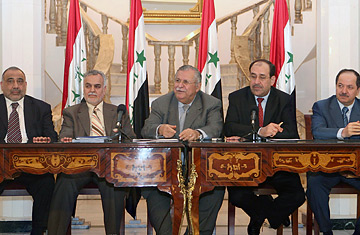
Iraqi President Jalal Talabani (C), Vice-Presidents Adel Abdel Mahdi (L) and Tareq al-Hashemi (2nd L), Prime Minister Nuri al-Maliki (2nd R) and leader of the autonomous Kurdish region in northern Iraq Massud Barzani hold joint press conference at Baghdad's heavily fortified Green Zone, August 27, 2007.
Barely a week goes by in Iraq without a new example of why talking about national reconciliation is far easier than actually accomplishing it.
Late on Sunday five Iraqi politicians, representing the country's Sunni, Shi'ite and Kurdish constituencies, announced a deal to allow some former members of Saddam Hussein's Ba'ath Party to return to government jobs, which has been a key demand of Iraq's Sunni Arabs. U.S. Ambassador Ryan Crocker called the announcement a "positive and encouraging message."
But a day after signing the deal the country's Sunni vice president, Tariq al-Hashemi, announced that the Sunni bloc that walked out of the government August 1 still had no plans to return. "Our previous experience with the government has not been encouraging," he explained, "and we will not go back just because of promises, unless there are real and tangible reforms."
Hashemi's skepticism highlights a fundamental problem of mistrust at the highest levels of government. Prime Minister Nouri al-Maliki came into office promising to break the power of Shi'ite militias, but as his fragile government teeters on the edge of collapse, those same militias are stronger than ever. The government's credibility is so low that none of its promises can be taken at face value.
And Sunday's deal was more notable for who wasn't involved than who was. The agreement didn't include representatives from the bloc loyal to Shi'ite politician and militia chieftain Moqtada al-Sadr. A senior Western diplomat earlier this month praised Maliki for distancing himself from Sadr, widely viewed as the Shi'ite leader most responsible for sectarian violence, but American officials are well aware that Sadr and his followers cannot simply be marginalized.
The Sadrists are a powerful presence in parliament and in several key government ministries. Their Mahdi Army militia has infiltrated the Iraqi Security Forces. As a practical matter, an agreement to reconcile with former Ba'athists is next to meaningless without Sadr's acquiescence. And the Sadrists weren't absent simply from Sunday's deal. At the moment they are not even part of the government; like their Sunni adversaries they are engaged in a boycott.
Sunni political leaders have a similar problem. As the same Western diplomat put it, there is "the question of the connection between national politics and what's happening on the local level." With the U.S. military cutting deals with Sunni tribes and ex-insurgents to help battle al-Qaeda in Iraq, the influence of the Sunnis' national political leadership becomes more and more questionable. "The Sunni community is a bit up for grabs right now," the diplomat said.
So once again, even if the politicians were acting in good faith, it's not at all clear that they speak for the armed men who can veto any high-level compromise. The agreement may give Ambassador Crocker some rare and much-needed good news to highlight when he delivers his surge status report to Congress next month. But, as a senior American military official said earlier this month, "it is going to require some sustained effort and inspired political leadership to overcome the hostility and hate and mistrust that's grown up around the political structure here in Iraq."
By that standard true reconciliation is as far off as ever.
